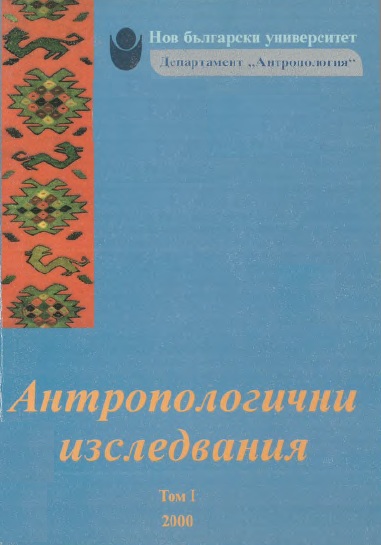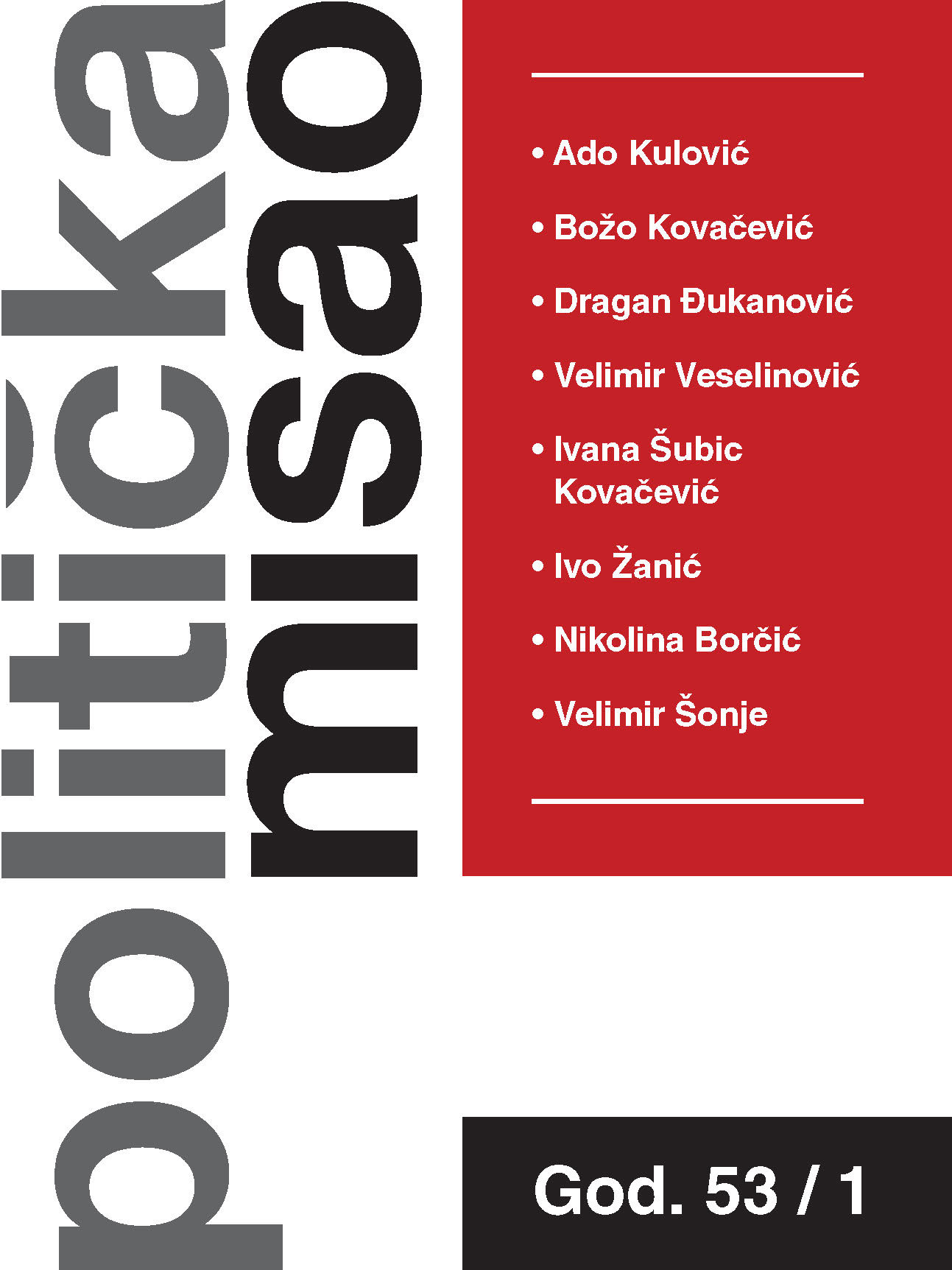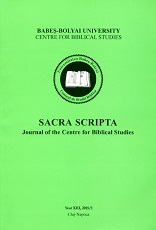


Keywords: anthropology; history;
More...
Keywords: anthropology; religion;
More...
Keywords: anthropology; religion; holy books;
More...
Keywords: Bulgaria; Catholic Church;
More...
Keywords: mask; masking traditions; folklore;
More...
Keywords: folklore; musical performance;
More...
Keywords: transvestism; anthropology;
More...
Keywords: anthropology; kinship; moral;
More...
Keywords: Geopolitics; Contemporary Geopolitical Theory; Geopolitics of the Sea; Republic of Croatia; Adriatic Sea;
This paper consists of two parts. The first part deals with the term “Geopolitics of the Sea” and it relies on relevant literature written by authors prominent in the field of geopolitical theories. The term is therefore introduced and defined in order to enhance its theoretical and disciplinary credibility. Interlinked with the essence of that discussion, this part further addresses: phenomena, geographic scale, subjects, and the relation of Geopolitics of the Sea to concomitant disciplines. Special emphasis is placed on the contemporary meaning of the term, given that contemporary geopolitics is scientifically established and that the general significance of the Sea is increasingly pronounced. The second part of the paper is an experiment i n which – based on the findings presented in the first part, but also by introducing new theoretical notions – the Republic of Croatia is analysed as a subject of Geopolitics of the Sea. Maritime boundary disputes are recognised as the basic “cognitive pillar” of this country’s Geopolitics of the Sea. Additionally, recent geopolitical activities are analysed by utilising the methodology of the “three-fold typology of geopolitical reasoning” from Critical Geopolitics. The paper also addresses Croatian geopolitical identity in relation to the Sea. Finally, the second part of the paper is focussed on Croatian identity as both EU and maritime country.
More...
Keywords: Empire; Hegemony; Unilateralism; Neo-conservatism; Liberal Internationalism;
Discussions on American Great Strategy and position of America in the contemporary world take place mostly within the general confrontation between neo-conservatism and liberal internationalism. In this article I present positions of the authors who are discussing the same topics, but are not opting for any of the two dominant conceptions. Those who think that America should not become an empire consider, like those who think that America already is an empire, that unilateralism and preoccupation only with the exercise of selfinterest are dangerous. Instead of convincing itself and the world that numerous American interventions are the results of its altruism and good intentions, America needs to accept the fact that it is an empire and needs to face the price of its maintenance.
More...
Keywords: Vojvodina; Autonomy; Serbia; Political System; Ethnic Groups;
In this article, the author analyzes the development of the autonomy of Vojvodina after 1848, and points to a transformation of its fundamental characteristics in this period. Indeed, Vojvodina was created primarily as an aspiration of Serbs in Southern Hungary to establish their own autonomy. However, during the XX century, especially during World War II, the character of autonomy has changed from explicitly ethnic to multiethnic, until its suspension in 1988. The author, therefore, considers that this via facti abolition of Vojvodina’s autonomy was just one of the initial events related to the collapse of the complex Yugoslav federalism in the early 1990s. New political trends in Serbia after 2000 have also not contributed to changing this situation. Moreover, the author concludes that the otherwise collapsed autonomy of Vojvodina within the Republic of Serbia will continue to gradually disappear and that its civil and multiethnic identity will be marginalized again, including the cultural, historical, geographical and other unique characteristics of this part of the country.
More...
Keywords: Franjo Tuđman; Croatian Party of Right; Dobroslav Paraga; Ante Paradžik; Anto Đapić;
Based on the archive materials, press analysis and relevant literature review, the author reconstructs the relationship between Franjo Tuđman and far right political parties in Croatia. The main argument is that the relationship between Tuđman and HSP (leading far right party) had two phases of development. Throughout the first phase (1990-1993) there was radical critique directed towards Tuđman and his government. Tuđman on the other hand never approved of the fact that HSP was using Ustaše symbols and myths to gain popularity. The beginning of the second phase was marked by the change in HSP leadership. Throughout the second phase HSP was less critical about Tuđman and the state leadership. Tuđman on the other hand tolerated HSP and its political activity.
More...
Keywords: Women; Parliamentary Elections; The Kingdom of SHS; Dom; Political Culture;
This article analyses the Zagreb newspapers of the major political parties and the presence of women in the political sections during the time of the first parliamentary elections (1920-1927). During this period, women were actively struggling to obtain the right to vote at the elections, as well as for equality in the workplace. Women’s struggle for political rights was not recorded in Zagreb’s party press, despite its existence. The analysis of the political sections in the newspapers has shown that women were rarely mentioned, and in those instances were presented only as mothers and housewives. They were mentioned the most in the sections of Dom (48 times), and only 6 times in Radikalski glasnik and Riječ, while they were mentioned the least in Jutarnji list (5 times). Dom is the only political newspaper that presented women in its political sections in a positive light. Radikalski glasnik and Riječ had only brief mentions of women, and mostly in a negative light, while Jutarnji list, as a neutral informative party paper, had almost no mentions of women in its political sections.
More...
Keywords: Egalitarian Syndrome; Županov; Inequalities; Modernisation; Economic Development;
Within the recent discussion among Croatian political scientists and sociologists about the egalitarian syndrome theory proposed by Josip Županov in the 1970s, two issues arose that are particularly important for economists. First, is the egalitarian syndrome an obstacle to economic development or is it a mere response to given development problems? Second, if the egalitarian syndrome is a set of cultural norms, how strong is their influence on the dynamics and level of economic development? These topics have not been addressed in the recent discussion among sociologists. Introduction of additional variables into the analysis of the link between inequality and social changes shows that particular cultural norms, such as the desire for redistribution, may influence social development, but the direction and strength of this impact are uncertain. Two variables are important in this regard: the pace of cultural changes and the level of their endogeneity or exogeneity in relation to economic development. Županov did not analyse the impact of these variables, but assumed a kind of cultural determinism. This was also the approach taken by contemporary proponents of his theory. Without incorporating the egalitarian syndrome theory into a broader theoretical framework which would define and test the relationship between cultural norms, their changes and economic development, it will not be possible to determine whether the values of egalitarianism as measured by Štulhofer and Burić represent obstacles to social development
More...
Javno predavanje uz diskusiju, u suorganizaciji Sekcije za teorijsku sociologiju i Sekcije “Društvo, ekonomija, rad” Hrvatskog sociološkog društva te Odjela za sociologiju Matice hrvatske, 4. studenoga 2015.
More...


Hans Klein, Der erste Korintherbrief. Übersetzt und erklärt. Honterusverlag. Sibiu/Hermannstadt. 2013, 260 Seiten
More...
Hans Klein, Der zweite Korintherbrief. Übersetzt und erklärt. Honterus Verlag. Sibiu/Hermannstadt.2015, 265 Seiten
More...